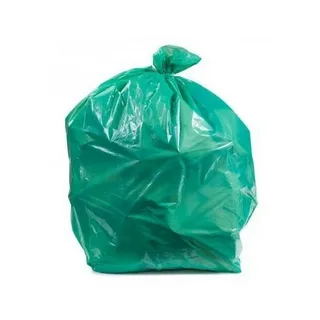Embracing Sustainability And Rise of Compostable Garbage Bags
Daftar Isi
Introduction to Compostable Garbage Bags
In an age where environmental consciousness is on the rise, the need for sustainable alternatives to everyday products is more pressing than ever. One such product gaining popularity is compostable garbage bags. These bags offer a solution to the environmental issues posed by traditional plastic bags, providing a more eco-friendly option for waste disposal.
Environmental Impact of Traditional Plastic Bags
Traditional plastic bags have long been a staple in households and businesses alike. However, their convenience comes at a significant cost to the environment. Plastic bags take hundreds of years to decompose, leading to pollution of landfills, oceans, and ecosystems. The production of plastic bags also contributes to greenhouse gas emissions and relies heavily on non-renewable resources.
What Are Compostable Garbage Bags?
Compostable garbage bags are an eco-friendly alternative to traditional plastic bags. Made from biodegradable materials such as plant-based polymers, these bags break down into natural components when disposed of properly. Unlike conventional plastic bags, compostable bags do not linger in landfills for centuries, reducing their environmental impact significantly.
Advantages of Using Compostable Garbage Bags
Compostable garbage bags offer several advantages over their traditional counterparts. Firstly, they help reduce the amount of plastic waste entering landfills and oceans, thereby mitigating environmental pollution. Additionally, compostable bags contribute to the production of nutrient-rich compost when disposed of in a composting facility, further promoting sustainability.
Types of Compostable Materials Used
Compostable garbage bags are typically made from renewable resources such as corn starch, sugarcane, or potato starch. These materials are biodegradable and can be broken down by microorganisms in the environment, leaving behind no harmful residues.
How Compostable Garbage Bags Work
When disposed of in a composting environment, compostable garbage bags undergo a process of decomposition facilitated by microorganisms such as bacteria, fungi, and enzymes. These microorganisms break down the organic matter in the bags, converting them into compost that can be used to enrich soil and promote plant growth.
Comparing Compostable Garbage Bags with Traditional Plastic Bags
In terms of functionality, compostable garbage bags perform similarly to traditional plastic bags. They are durable, tear-resistant, and suitable for holding various types of waste. However, unlike plastic bags, compostable bags do not pose a long-term threat to the environment and wildlife.
Disposal and Decomposition Process
Proper disposal of compostable garbage bags is essential to ensure their effective decomposition. These bags should be disposed of in a composting facility or a municipal composting program where they can break down naturally. When compostable bags are subjected to the right conditions, they decompose within a matter of weeks or months, leaving behind nutrient-rich compost.
Cost Comparison: Compostable vs. Traditional Bags
While compostable garbage bags may have a slightly higher upfront cost than traditional plastic bags, their long-term benefits outweigh the initial investment. The environmental savings and potential cost savings from reduced waste management expenses make compostable bags a financially viable option in the long run.
If you want to know more information about bulk chocolate milk cartons visit ToUSAPackaging.
Compostable Garbage Bags in the Market
The market for compostable garbage bags has grown significantly in recent years, driven by increasing consumer demand for sustainable products. Many manufacturers now offer a variety of compostable bag options, including different sizes, thicknesses, and materials, to cater to various needs and preferences.
Choosing the Right Compostable Garbage Bag
When selecting compostable garbage bags, it’s essential to consider factors such as size, durability, and certification. Look for bags that meet industry standards for compostability, such as those certified by organizations like the Biodegradable Products Institute (BPI) or European Bioplastics.
Are Compostable Garbage Bags Suitable for All Waste Types?
While compostable garbage bags are suitable for most household waste, some materials may not be suitable for composting, such as certain plastics, metals, and chemicals. It’s essential to segregate waste properly and avoid contaminating compostable bags with non-compostable materials.
Benefits Beyond Environmental Impact
The benefits of compostable garbage bags extend beyond environmental impact. By choosing sustainable alternatives, consumers can support eco-friendly practices and encourage manufacturers to prioritize sustainability in their product offerings. Additionally, using compostable bags can inspire others to adopt more environmentally conscious behaviors, creating a ripple effect of positive change.
Best Practices for Using Compostable Garbage Bags
To maximize the effectiveness of compostable garbage bags, follow these best practices:
- Use the appropriate bag size for your waste disposal needs to minimize excess material.
- Avoid overfilling bags to prevent tears and leaks during transport.
- Store compostable bags in a cool, dry place away from direct sunlight to prolong their shelf life.
- Dispose of compostable bags in designated composting facilities or programs to ensure proper decomposition.
- Educate others about the benefits of compostable garbage bags and encourage widespread adoption of sustainable waste management practices.
Conclusion: Embracing Sustainability with Compostable Garbage Bags
In conclusion, compostable garbage bags offer a sustainable solution to the environmental challenges posed by traditional plastic bags. By choosing compostable alternatives, individuals and businesses can reduce their carbon footprint, minimize waste pollution, and contribute to a healthier planet for future generations. Embracing sustainability is not just a choice but a responsibility we all share in preserving the Earth’s precious resources.

